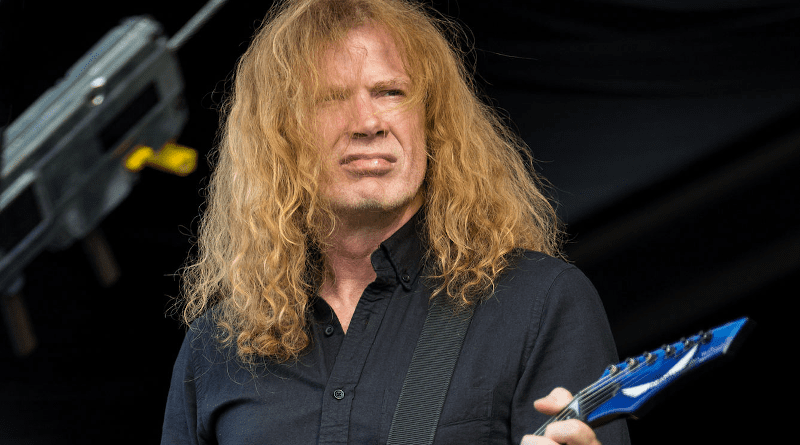Dave Mustaine’s Crucial Lesson For Entrepreneurs – OpEd
By MISES
By Jeff Deist*
Listeners of The Human Action Podcast and Radio Rothbard sometimes remark on the intro and outro music from heavy metal band Megadeth.
Fans of this genre are very familiar with both the band and its founder, legendary guitarist Dave Mustaine. Mustaine is well-known among both fans and his musical colleagues as a highly skilled technical guitarist who composes remarkably complex and unique songs. Guitar World ranks Mustaine sixth in its listing of the top one hundred metal guitarists of all time. His talent and commercial success are undeniable, especially given his career of nearly forty years in a very tough and cutthroat industry.
Yet fans and even music critics might not know Mustaine is almost entirely self-taught. He has not studied music theory, and does not read music or use guitar tablatures. In fact, during a recent interview, Mustaine discussed his collaborative relationship with bandmate and fellow guitarist Kiko Loureiro. Loureiro, in contrast to Mustaine, studied music theory, piano, and classical guitar from a young age in his native Brazil. Thus, at a fan workshop they attended together, Loureiro was able to describe the dynamics, keys, tempos, and articulation of a particular Megadeth song using the specific language of music theory—to Mustaine’s good-natured but somewhat bewildered amusement.
As Loureiro told Blabbermouth magazine:
You have to understand that people are different,” he continued. “A creator can play something and just imagine the mountain, the sea, the hell, a war—imagine things, those sounds. He can relate that riff to a machine gun or can relate that riff to a bomb exploding, in the case of MEGADETH. But he can play a chord and imagine the mountain, the sun, sailing—whatever. So some people are like this. Some other people, they need the theory—they need the names, they need the things organized to make sense. So that’s why some people really relate to the theory and love theory. I love theory. Some other people don’t feel they need theory to compose, to create, because it’s all about imagination. And, of course, the basic stuff they might know—”Oh, this is a major chord,” “This is a minor chord,” “This is the name of the notes, like E, A, D,” but in the end, it really doesn’t matter as well.
So, does Dave Mustaine use theory? No, he doesn’t.
We all recognize this phenomenon from our own experience: some people have to know and understand the whys of any endeavor while some people focus on the hows. And often the latter group is far better at execution, in business or otherwise, simply because they focus more intently on end results. They get out of their own way and have a strong, demonstrated aptitude for action over introspection.
As Dave Mustaine puts it when describing his guitar playing and songwriting: “I know what I’m doing, but I don’t know what it is that I’m doing.”
This surely is true of countless entrepreneurs, musicians, artists, athletes, parents, and successful people in all walks of life! They may have no formal training, education, credentials, or theoretical grounding in their chosen professions but succeed by doing—through a bias for action. Mustaine’s key insight, shared intuitively by such people, is a relentless focus on results rather than process. This is a vital trait common to all successful entrepreneurs.
The opposite is true of bureaucratic minds, whether in government or private companies. The work itself, rather than the end result or goals, becomes the whole focus. And so it expands to fill an allotted time, such as a forty-hour workweek or a preset product deadline. In bureaucracies, a managerial mindset grows and dominates. Credentialism and seniority become the path to advancement and raises, rather than demonstrated contributions to the bottom line. As a result of this process focus, both customers (or constituents) and employees are worse off in the long run.
The price and—more importantly—the value of any good or service are not determined by cost, labor, or some mysterious inherent quality. This key insight of Austrian economics—that value is subjective and marginal, something to be experienced by the consumer and facilitated by the entrepreneur—indirectly or subconsciously informs the work of all successful businesses. And thus a relentless customer focus—in keeping with Mises’s concept of “consumer sovereignty”—is a mainstay of the business training available on our Economics for Business platform.
The value of Dave Mustaine’s music ultimately is determined by fans, experiencing it through their own highly subjective and individual aesthetic preferences. Mustaine’s genius, both from a musical and business perspective, lies in taking his talents and drive for musical expression and creating value through a focus on results. For Mr. Mustaine and countless successful entrepreneurs, how matters more than why.
*About the author: Jeff Deist is president of the Mises Institute, where he serves as a writer, public speaker, and advocate for property, markets, and civil society. He previously worked as a longtime advisor and chief of staff to Congressman Ron Paul, for whom he wrote hundreds of articles and speeches. In his years with Dr. Paul he worked with countless grassroots activists and organizations dedicated to reducing the size and scope of government.
Source: This article was published by the MISES Institute

